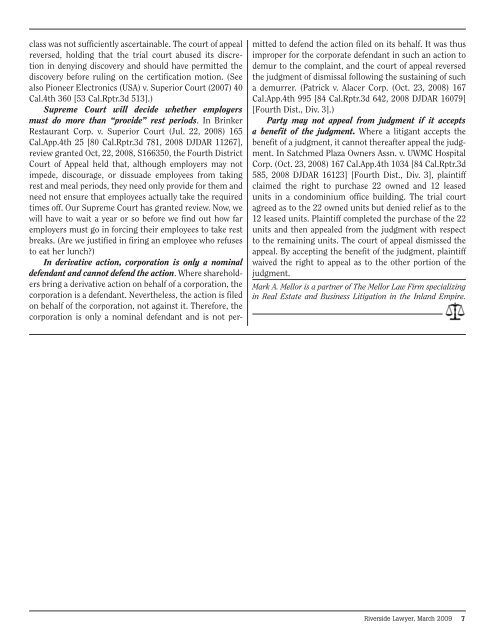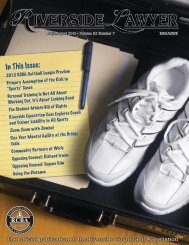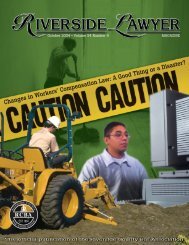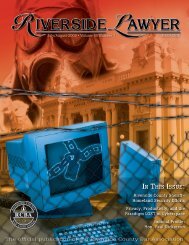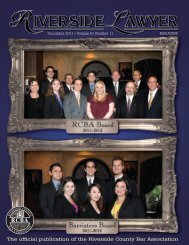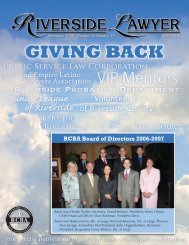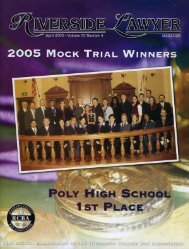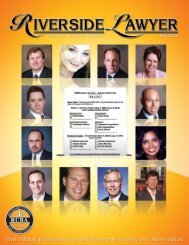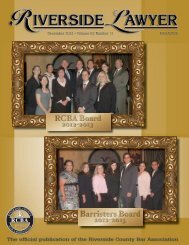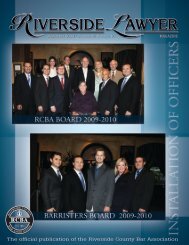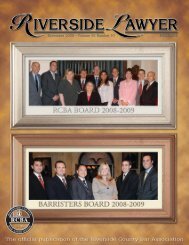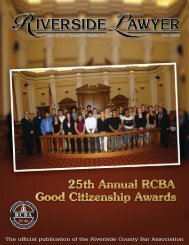In This Issue: - Riverside County Bar Association
In This Issue: - Riverside County Bar Association
In This Issue: - Riverside County Bar Association
Create successful ePaper yourself
Turn your PDF publications into a flip-book with our unique Google optimized e-Paper software.
class was not sufficiently ascertainable. The court of appeal<br />
reversed, holding that the trial court abused its discretion<br />
in denying discovery and should have permitted the<br />
discovery before ruling on the certification motion. (See<br />
also Pioneer Electronics (USA) v. Superior Court (2007) 40<br />
Cal.4th 360 [53 Cal.Rptr.3d 513].)<br />
Supreme Court will decide whether employers<br />
must do more than “provide” rest periods. <strong>In</strong> Brinker<br />
Restaurant Corp. v. Superior Court (Jul. 22, 2008) 165<br />
Cal.App.4th 25 [80 Cal.Rptr.3d 781, 2008 DJDAR 11267],<br />
review granted Oct, 22, 2008, S166350, the Fourth District<br />
Court of Appeal held that, although employers may not<br />
impede, discourage, or dissuade employees from taking<br />
rest and meal periods, they need only provide for them and<br />
need not ensure that employees actually take the required<br />
times off. Our Supreme Court has granted review. Now, we<br />
will have to wait a year or so before we find out how far<br />
employers must go in forcing their employees to take rest<br />
breaks. (Are we justified in firing an employee who refuses<br />
to eat her lunch?)<br />
<strong>In</strong> derivative action, corporation is only a nominal<br />
defendant and cannot defend the action. Where shareholders<br />
bring a derivative action on behalf of a corporation, the<br />
corporation is a defendant. Nevertheless, the action is filed<br />
on behalf of the corporation, not against it. Therefore, the<br />
corporation is only a nominal defendant and is not permitted<br />
to defend the action filed on its behalf. It was thus<br />
improper for the corporate defendant in such an action to<br />
demur to the complaint, and the court of appeal reversed<br />
the judgment of dismissal following the sustaining of such<br />
a demurrer. (Patrick v. Alacer Corp. (Oct. 23, 2008) 167<br />
Cal.App.4th 995 [84 Cal.Rptr.3d 642, 2008 DJDAR 16079]<br />
[Fourth Dist., Div. 3].)<br />
Party may not appeal from judgment if it accepts<br />
a benefit of the judgment. Where a litigant accepts the<br />
benefit of a judgment, it cannot thereafter appeal the judgment.<br />
<strong>In</strong> Satchmed Plaza Owners Assn. v. UWMC Hospital<br />
Corp. (Oct. 23, 2008) 167 Cal.App.4th 1034 [84 Cal.Rptr.3d<br />
585, 2008 DJDAR 16123] [Fourth Dist., Div. 3], plaintiff<br />
claimed the right to purchase 22 owned and 12 leased<br />
units in a condominium office building. The trial court<br />
agreed as to the 22 owned units but denied relief as to the<br />
12 leased units. Plaintiff completed the purchase of the 22<br />
units and then appealed from the judgment with respect<br />
to the remaining units. The court of appeal dismissed the<br />
appeal. By accepting the benefit of the judgment, plaintiff<br />
waived the right to appeal as to the other portion of the<br />
judgment.<br />
Mark A. Mellor is a partner of The Mellor Law Firm specializing<br />
in Real Estate and Business Litigation in the <strong>In</strong>land Empire.<br />
<br />
<strong>Riverside</strong> Lawyer, March 2009 7


